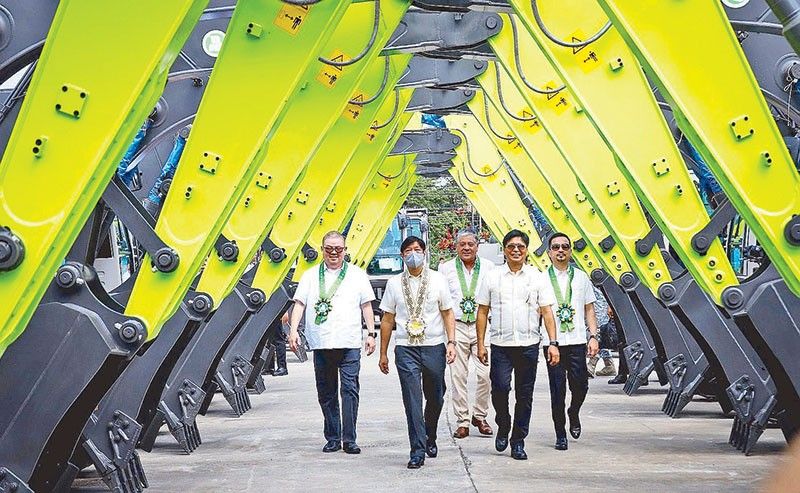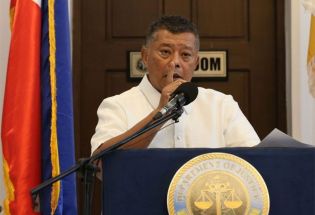Marcos rushes irrigation projects for El Niño

MANILA, Philippines — President Marcos yesterday directed state agencies to finish the construction of irrigation facilities and similar projects in four months to ensure enough water supply as the country braces for El Niño.
In a speech delivered in Nueva Ecija, Marcos said rains may not be that frequent in January so everything must be done to prepare for El Niño, which is seen to persist until the second quarter of next year.
“Because we do not have much time... I thought about the projects we will undertake. We have four months to finish all of them, to make them operational. Because that is the deadline I set for the departments,” Marcos said during the inauguration of the Balbalungao Small Reservoir Irrigation Project in Lupao town.
“I told them, we have to think of what we can finish by April of next year so that when May comes, when there is a dry spell and it is not raining, we have enough water supply,” he added.
According to the Philippine Atmospheric Geophysical Astronomical Services Administration (PAGASA), El Niño increases the likelihood of below-normal rainfall conditions, which could bring negative impacts like dry spells and droughts in some areas.
On Tuesday, Science Secretary Renato Solidum Jr. said about 65 provinces may be affected by severe drought by the first half of 2024.
He added that the effects of El Niño are currently felt in some areas in the country, and this is characterized by the reduction of rainfall up to 80 percent, which led to dry conditions.
He has likened the prevailing El Niño to the 1997-1998 event – the worst experienced by the country that left billions of pesos in damage to agriculture.
Moderate to severe drought conditions may be experienced from February to May next year, the science chief added.
Solidum said the majority of the global climate model suggests that El Niño will likely persist until the second quarter of 2024.
Marcos noted that low water supply could also cause problems in the health and power sectors, describing the present situation as “urgent.”
“Many get sick when it is hot so we have to prepare the hospitals also, we have to ensure that they have enough power supply and water supply, especially in big cities. We have to ensure that there is drinking water. We have to make sure that our countrymen will have a water source,” he said in Filipino.
Marcos said he has created an El Niño task force under his office but its structure has to be modified to boost the country’s preparedness measures.
Multi-purpose dam
As part of the efforts to ensure food security, Marcos led the inauguration of the Balbalungao Small Reservoir Irrigation Project, a project that is expected to benefit 562 farmers and their families in Lupao.
The multi-purpose dam will provide irrigation to about 840 hectares of agricultural land in Barangays San Isidro, Balbalungao, Salvacion and Mapangpang and will also serve as flood control mitigation infrastructure.
It is seen to generate diversified income opportunities through increased crop yields, fish culture, tourism and watershed management for environmental protection and facilitate hydroelectric power generation.
Marcos said the project is part of the continued efforts of the Department of Agriculture (DA) and the National Irrigation Administration to boost rice productivity in Nueva Ecija, which is known as the “rice bowl of the Philippines.”
Aside from accelerating the building of dams and flood-control projects, Marcos said the government is also embarking on a new information campaign to make people understand El Niño and encourage them to save water and collect rainwater.
LGU preparation
Former agriculture secretary Leonardo Montemayor said yesterday that many local government units (LGUs) have yet to prepare for the possible impact of El Niño on the agricultural sector, emphasizing their importance in mitigating the effects of the phenomenon.
In a radio interview, Montemayor cited his experience where local agriculturists from a municipality admitted that they have yet to start preparing for El Niño.
“One manifestation if we are ready is if the LGUs are doing the necessary preparations, like if they are coordinating with the farmers. As of now, the DA has no direct contact with the farmers. It’s through the mayors and the technicians under the mayors and governors,” Montemayor said.
He added that PAGASA should provide accurate and timely information to the farmers.
“The DA, the Department of the Interior and Local Government and other agencies should relay this information to our farmers and planting materials should be made available in case they cannot plant,” Montemayor said.
He added that the DA should provide small water impounding systems and irrigation systems to lessen the impact of the drought, which can be finished in just a few weeks.
According to him, the first to be affected during the drought is palay as it needs a big amount of water.
The DA should provide farm technicians who should be able to advise farmers if they need to shift to other crops, he said.
“Corn seedlings, root crops and other planting materials should be readied so that the LGUs can distribute the said planting materials to the farmers,” he added.
- Latest
- Trending






























